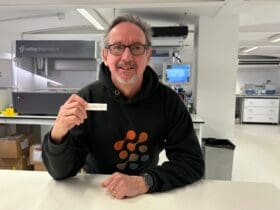Cardiff nurse Liam Dando has had his fair share of being on the other side of a hospital bed. As a child he was a regular patient at the Children’s Hospital for Wales in Cardiff but these days he works alongside some of the nurses who took care of him. And as the NHS celebrates its 70th birthday this year, he is grateful for the care he’s received throughout his life.
At the age of five, Liam (now 26), was diagnosed with Hyper I.G.E syndrome STAT 3, a rare immunodeficiency disease which causes eczema, skin abscesses, recurrent lung infections and high serum levels of IgE antibodies. He had numerous treatments and lengthy stays in hospital throughout his childhood and underwent several procedures to treat his condition.
Liam says:
[aoa id=”1″]“If I had to describe my time in hospital I would start by saying that to me it was my life. I was exposed to the clinical environment and had many different interventions and procedures – from portacath insertions and having broken bones fixed to even kidney failure – but to me it was my second home, and the cheeky boy that I was, I treated it like that. I would be staying up till late playing games or watching videos. I don’t regret any part of it because without it I wouldn’t be the person I am today and I think it gave me the passion to become a children’s nurse.”[/aoa]
After training at Swansea University, Liam began working on the Owl Ward in the children’s hospital alongside some of the staff who treated him as a child.
He remembers:
“One of my fondest memories is of the late Jennifer King who was the ward manager on West 1. She would take me on daily walks around the hospital on a little children’s trike that I would use to pedal around the ward. She would always take the time to do that with me.
“On other occasions, when I had to be admitted for antibiotic treatment, I would always be in the same cubicle. I was in there so much that drawings of animals were put onto the walls with my family’s names on. I was Liam the little monkey!”
Liam’s health issues became more serious when he was admitted for a bone marrow transplant at the age of 13. The transplant was experimental and had a 50% chance of success. Liam was the first boy in the UK to receive the pioneering treatment. “Before the transplant I treated my visits like any other stay in hospital,” he says, “and I was kept in a secured room in a bubble, so to me it was almost like getting on with it rather than doing something new. But it became more difficult during the transplant as I had to go through a lot of chemotherapy to wipe out my existing immune system. This is when I was at my lowest but I managed to get through it. It was amazing in the few months afterwards not to have had an admission into hospital and thankfully I haven’t needed to be admitted for a chest infection now for 13 years. I celebrated 13 years post-transplant on 6th April 2018, which means that I have been out of hospital for the same amount of time that I spent inside so it was a great milestone for me!”
Far from putting him off, his regular stays in hospital firmly encouraged him into a nursing career. “I think my overall experience in hospital has played a big part in my chosen career. The people who looked after me have a massive part to play. My favourite nurse (the late Jenny King) would wake me up at 8am and, being a 12-year-old boy, you can imagine that didn’t go down well! But she was great and they don’t make them like her anymore.”
He adds: “I think having my own health experiences has made me a better person, and certainly a better nurse. I’ve been able to relate to a lot of the children that I have looked after. I have no regrets and I can’t really think how my life would have been without practically living on West 1 for all those years.”
He continues: “I love my job, even though working with unwell children can be tough at times. I think what we do as a team for the children and their families definitely outweighs any unpleasant feelings at the end of a shift.”
And what about his colleagues who remember him as a very poorly child? “I think some of them find me a big reminder of their age”, he laughs, “but Cardiff Children’s Hospital is somewhere I have wanted to work since I started my training and it seemed natural that I would run into some old faces – from consultants to nurses – who are all my colleagues now.”
Despite his illness, Liam still managed to pursue his studies and has even won prestigious awards along the way. He explains: “While I was training I won the student nurse award for best practice with service users and care involvement. This was for a trip to Lourdes with an organisation that takes unwell children to a site of religious importance.”
Over the years the NHS has constantly needed to evolve to keep up with the demands of fast-paced change. “The treatment I received has changed dramatically,’ says Liam. “I think it’s great to see that patients with recurring chest infections can now be managed at home rather than coming back and forth to hospital. I am pleased that we are making advances every day that can make the life of a patient with an on-going condition much easier.”
As the NHS reflects back on the last 70 years, it also looks to the future as it constantly changes and improves to meet demands, as Liam explains: “Working in paediatric surgery presents an opportunity to constantly learn while on the job. I work in an area that receives a wide patient base, ranging from oncology to neuro-surgery. I predict my area will evolve by introducing new ways of improving patient care, such as the recent implementation of the new pre-admission service for surgery which has greatly reduced the amount of cancelations and improved overall patient care.”
“The NHS is under a lot of strain, stemming from staff shortages and an ageing population, but with the good care that staff provide, if it can reach 70 years it can definitely survive another 70.”








Leave a Reply
View Comments